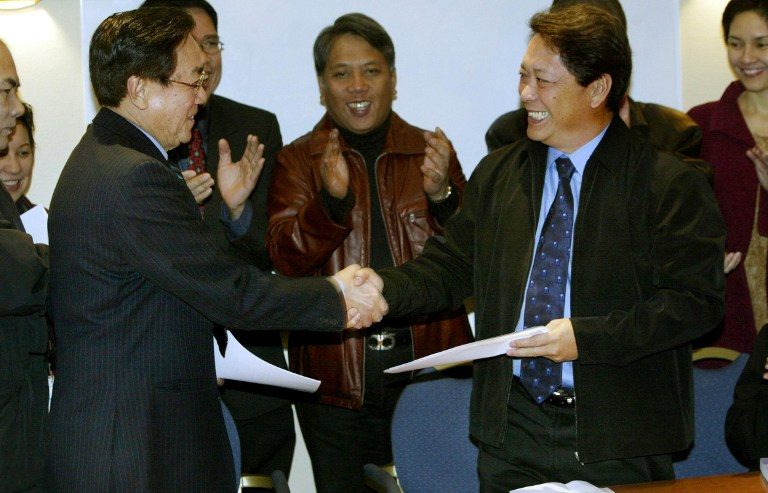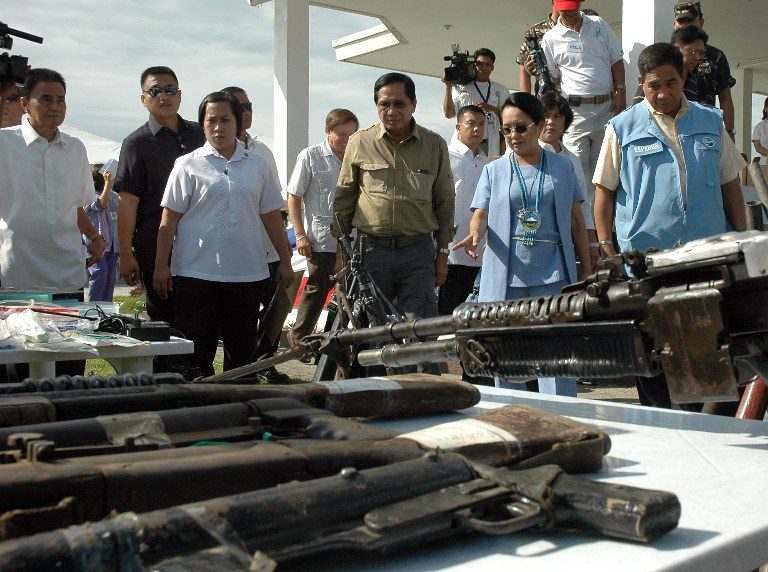SUMMARY
This is AI generated summarization, which may have errors. For context, always refer to the full article.

MANILA, Philippines – Two names linked to a former president are being given another chance to make peace happen between the Philippine government and insurgents.
Silvestre “Bebot” Bello III and Jesus Dureza were chosen by President-elect Rodrigo Duterte to work on peace negotiations under his incoming administration. (READ: Who’s who in the incoming Duterte cabinet)
Aside from being labor secretary in the Duterte Cabinet, Bello will also take on the role of “consultant” for peace talks with the Left. Dureza, meanwhile, will serve as Duterte’s adviser for the peace process with Moro rebels.
The incoming president has openly declared his agenda for “inclusive” peace and order that includes discussions with rebels such as the Moro Islamic Liberation Front (MILF) and the New People’s Army (NPA) – groups that Duterte has developed a relationship with throughout the years as local chief executive.
Can Bello and Dureza’s past involvement with the warring factions contribute to the promised peace?
Bello and the CPP
Although they’ve handled different positions under past presidents, what links the two together are their involvement in the peace process under former president Gloria Macapagal Arroyo.
Bello’s incoming stint with government is aligned with what he did in the past. The former solicitor general and justice secretary chaired the government panel in talks with the Communist Party of the Philippines-New People’s Army-National Democratic Front (CPP-NPA-NDF) from 2001 to 2004.
It was during the start of the Arroyo administration when the government peace panel conducted “goodwill talks”, following the termination of negotiations and the Joint Agreement on Safety and Immunity Guarantees (JASIG) under the administration of Joseph Ejercito Estrada.

In April 2001, both parties formally resumed the negotiations in Oslo, Norway.
The government panel, however, declared a recess later that year after then congressman Rodolfo Aguinaldo was gunned down by members of the NPA as it was a “violation of commitment to confidence building measures.”
The two parties resumed the talks in 2004 after a break which lasted for 3-and-a-half years. It was short-lived, however, as the NDF postponed the negotiations after the CPP-NPA and exiled founding chairman Jose Maria Sison was listed as a terrorist in the United States.
In 2007, there were efforts to resume the talks but the CPP rejected it.
It was only during the administration of Benigno Aquino III in 2011 when formal talks resumed between the Philippine government and the NDF. According to the Office of the Presidential Adviser on the Peace Process (OPPAP), the two parties agreed to a timeframe of 18 months to complete the negotiations under The Hague Joint Declaration.
Dureza and the MILF
The Ramos administration held the first exploratory talks with the MILF which culminated in the signing of “general cessation of hostilities” between the two parties in July 1997.
Estrada, however, declared an all-out war in 2000. Although his action led to the fall of Camp Abubakar, more than a hundred lives were lost.
It was only under the Arroyo administration when the negotiation with the MILF resumed.
With Dureza as chief peace negotiator, the government peace panel and MILF came up with a general framework on the resumption of peace talks and signed the Agreement on Peace Between the Government of the Republic of the Philippines and MILF in 2001. In August 2001, both parties signed a formal ceasefire.
Dureza was appointed Arroyo’s presidential adviser on the peace process from 2005 until 2008.

Although he was already press secretary in the latter part of 2008, Dureza was still dragged in the controversy surrounding the Memorandum of Agreement on Ancestral Domain (MOA-AD) which would have created the Bangsamoro Juridical Entity (BJE).
In 2005, at the start of his term as peace adviser, exploratory talks which led to the draft MOA-AD were held.
The draft peace deal, however, was met with intense criticism. One of its most vocal opponent was incoming Agriculture Secretary Emmanuel “Manny” Piñol who, in 2008, filed a petition with the Supreme Court (SC) to halt its signing.
Then Senate president pro tempore Jinggoy Ejercito Estrada even said that Dureza – together with two other members of the government peace panel – should be charged with treason “for selling the Filipino people, particularly the citizens in Mindanao.”
After releasing a temporary restraining order on the agreement, the High Court, on October 14, 2008, eventually ruled that the MOA-AD was unconstitutional and illegal. The decision, however, triggered attacks by the MILF in Mindanao – particularly in North Cotabato, Lanao del Norte, and Sarangani – which displaced more than 700,000 people.
The conflict and attacks initiated by disgruntled members of the MILF severely damaged the talks. The MILF, however, submitted a proposal for a final peace deal based on the dismissed MOA-AD. (READ: Bangsamoro bill: 7 issues for PH, MILF to resolve)
Future of the talks
Both the NDF and the MILF have said they are open to make peace with any administration.
In January, peace consultant Randy Feliz Malayao said that the NDF is open to the resumption of the peace negotiations “with any administration” given its paralyzed state under the watch of President Benigno Aquino III.
CPP founding chairman Jose Maria Sison, meanwhile, welcomed the appointment of the two whom he described as “not obsessed with trying to trip the NDF and push them over the cliff.”
“What’s good with the new government is that it is harnessing people who we already negotiated with so successfully so it’s good to have them again on the other side of the table,” he said in a Rappler interview. “They know how to defend the interest of their own government and at the same time, they recognize what’s reasonable between the Manila government and the NDF.”
As a sign of his commitment to peace, Duterte said that he already plans on sending Bello and Dureza to Oslo, Norway to initiate peace talks with the CPP. He said he is also ready to give Sison a “safe conduct pass” to go back to the Philippines where they can fully conduct peace negotiations.
Meanwhile, in an editorial published in Luwaran.com, the MILF said that the incoming Duterte government should start “to work for the early passage of the Bangsamoro Basic law (BBL) in Congress.”
This might be a problem as Duterte is known for his firm stand on federalism. According to Davao del Norte Representative Pantaleon Alvarez who was nominated for the House Speakership by the PDP-Laban, the president-elect’s campaign for federalism will render the BBL “moot.”
The BBL was supposed to implement provisions under the Comprehensive Agreement on the Bangsamoro (CAB) which was signed in 2014. However, its passage has been derailed due to controversies – especially in the aftermath of the Mamasapano clash in January 2015.
Can Dureza and Bello – the president-elect’s anointed ones for peace – help Duterte keep his promise of peace in 3-6 months? – Rappler.com
Add a comment
How does this make you feel?
There are no comments yet. Add your comment to start the conversation.